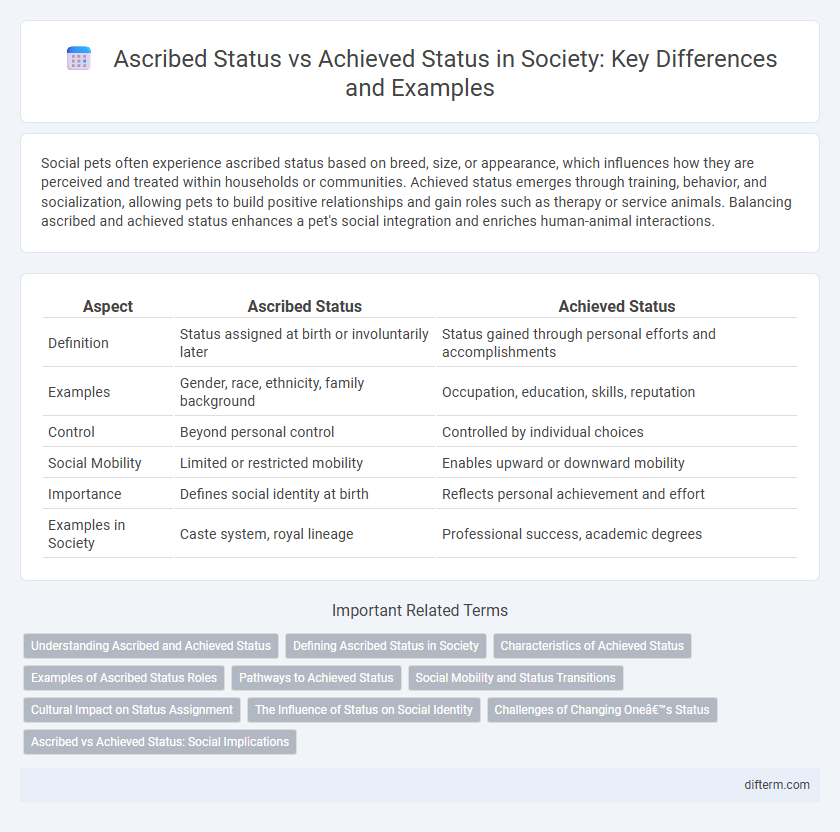Social pets often experience ascribed status based on breed, size, or appearance, which influences how they are perceived and treated within households or communities. Achieved status emerges through training, behavior, and socialization, allowing pets to build positive relationships and gain roles such as therapy or service animals. Balancing ascribed and achieved status enhances a pet's social integration and enriches human-animal interactions.
Table of Comparison
| Aspect | Ascribed Status | Achieved Status |
|---|---|---|
| Definition | Status assigned at birth or involuntarily later | Status gained through personal efforts and accomplishments |
| Examples | Gender, race, ethnicity, family background | Occupation, education, skills, reputation |
| Control | Beyond personal control | Controlled by individual choices |
| Social Mobility | Limited or restricted mobility | Enables upward or downward mobility |
| Importance | Defines social identity at birth | Reflects personal achievement and effort |
| Examples in Society | Caste system, royal lineage | Professional success, academic degrees |
Understanding Ascribed and Achieved Status
Ascribed status refers to the social position assigned at birth, based on characteristics such as race, gender, and family heritage, which individuals have little control over. Achieved status results from personal effort, skills, and accomplishments, including education, occupation, and social recognition. Understanding the distinction highlights how social mobility depends on both inherited traits and individual achievements within a society.
Defining Ascribed Status in Society
Ascribed status refers to the social position assigned to individuals at birth or involuntarily acquired, such as race, ethnicity, gender, or family heritage. This form of status shapes social identity and influences individuals' access to resources, opportunities, and social interactions throughout life. Unlike achieved status, which is earned through personal effort and accomplishments, ascribed status remains largely fixed and uncontrollable.
Characteristics of Achieved Status
Achieved status is characterized by its basis in personal effort, skills, and accomplishments rather than being assigned at birth or by social factors such as family background. This status is dynamic, allowing individuals to improve or change their social position through education, career success, or personal achievements. Examples include becoming a doctor, athlete, or entrepreneur, reflecting meritocracy and individual agency within social structures.
Examples of Ascribed Status Roles
In social contexts, examples of ascribed status roles include ethnicity, gender, and family heritage, which individuals are born into without personal choice. These roles often influence one's social identity and access to resources, impacting opportunities from an early age. Unlike achieved status, ascribed status is assigned by society based on inherent traits or lineage.
Pathways to Achieved Status
Achieved status is attained through individual efforts, skills, and accomplishments, often reflecting education, occupation, and personal talents as key pathways. Social mobility plays a critical role in transitioning from ascribed to achieved status by enabling individuals to change their social positions through merit-based opportunities. Educational attainment and professional success are primary mechanisms driving the acquisition of achieved status in modern societies.
Social Mobility and Status Transitions
Ascribed status is assigned at birth based on factors like race, gender, or family heritage, often limiting social mobility by constraining individuals within predetermined social strata. Achieved status, earned through personal effort, education, or career accomplishments, enables status transitions that facilitate upward social mobility and greater social fluidity. The interplay between ascribed and achieved statuses shapes social structures, influencing individuals' opportunities for advancement within society.
Cultural Impact on Status Assignment
Cultural norms and values play a critical role in determining ascribed status, which is assigned based on birth, ethnicity, or family heritage within a society. Achieved status, contrastingly, depends on individual accomplishments and actions, reflecting a culture's emphasis on meritocracy and social mobility. Societies with strong cultural rigidity often prioritize ascribed status, limiting opportunities for individuals to change their social positions regardless of personal achievements.
The Influence of Status on Social Identity
Ascribed status, determined by birth factors such as race, gender, and family background, significantly shapes social identity by establishing early societal expectations and access to resources. Achieved status, gained through individual accomplishments like education, occupation, or skills, allows for social mobility and personal identity development within various social structures. The interplay between ascribed and achieved statuses influences group affiliation, self-perception, and social interactions, reinforcing or challenging existing social hierarchies.
Challenges of Changing One’s Status
Changing one's social status presents significant challenges due to deeply ingrained societal norms and structural barriers linked to ascribed status, such as race, gender, and family background. Achieved status, which is earned through personal effort like education or career success, can offer mobility but is often limited by systemic inequalities and lack of access to resources. The tension between ascribed and achieved status highlights persistent obstacles in social mobility and the difficulty of overcoming prejudices and inherited disadvantages.
Ascribed vs Achieved Status: Social Implications
Ascribed status, determined by birth or innate characteristics such as race, gender, and family background, often shapes initial social opportunities and constraints. Achieved status, earned through individual effort, education, or accomplishments, can challenge or reinforce existing social hierarchies but remains influenced by ascribed factors. The interplay between ascribed and achieved status critically affects social mobility, access to resources, and the perpetuation of inequality within societies.
ascribed status vs achieved status Infographic

 difterm.com
difterm.com